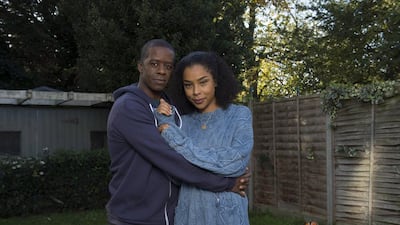In the current climate of controversy about the lack of diversity in Hollywood and beyond, it is perhaps inevitable that the new six-part British crime drama Undercover has attracted attention for bucking the trend.
Some media commentators have noted the pleasing rarity of a prime-time BBC series that not only features two black leads, but in which the colour of their skin has little to do with the plot. It comes after the BBC set out plans to improve its record on diversity, on and off the screen.
But for the show’s male lead, Adrian Lester, it is not an issue – and certainly not something he is interested in commenting on.
“I just wish I could get to the end of an interview without talking about diversity,” is all he would say on the subject.
Fair enough – he is entitled to be tired of constant questions about the colour of his skin. For him, it’s not so remarkable to be cast in a role such as this, as Nick, a middle-class dad, which is everyday life for lots of people, whatever their skin colour.
Of course, his seemingly normal family life has a twist, which is summed up in a moment of sheer anguish and conflict.
Nick, a former policeman, listens to an odd voicemail from his tearful wife, Maya (Sophie Okonedo, who gives a wonderful performance), pleading with him to come and find her. Then the hospital calls – his father is dying. For most people, prioritising which call to respond to first would be an agonising decision.
Nick, however, has no choice but to go to his wife – because Maya doesn’t even know her husband’s father is alive.
This is because Nick has been living a double life as an undercover police officer for 20 years.
"In a way, I had to play two characters," says Lester, who brilliantly imbues Nick with a quiet desperation, "because he's not able to be honest with his dad either. What is so fascinating about Undercover is that you see the cost of that on someone's life. He's been carved into pieces, really. Every day, he's kept a small lie going."
Inspired by shocking real-life revelations that British women in political and anti-racist groups had been tricked into long-term relationships by undercover policemen gathering information, playwright and screenwriter Peter Moffat wrote Undercover after wondering what happens when a whole marriage – a family – is based on not only a terrible secret, but a complete betrayal.
"The thing is, Nick is actually a devoted father and husband – that's the essence of him," says Lester, who is best known for his role as Mickey Bricks in the BBC con-artist caper Hustle.
“He was assigned to spy on an anti-fascist group that Maya was part of 20 years ago and she just has no idea who he is or who he was. And in a way, that’s all fine. Apart from feeling incredibly guilty, he can cope with that – until he’s asked to resume his old activities when Maya is suddenly in line to become the next director of public prosecutions.”
Lester says Undercover allows him a rare chance to explore on TV a character with the kind of complexity usually reserved for the Shakespearean characters he plays so well on the stage.
"Shakespeare has this great push and pull between what characters want to do and what they should do, and Undercover felt just like that – which is very rare in television," he says.
“It’s seriously hard-hitting, heavyweight drama that questions how we operate in society. But, in many ways, it’s also a heartbreaking love story.”
In the simplest terms, Nick is the villain, but the subtleties of Lester’s performance mean we will be rooting for him and hope he does the right thing. Lester modestly credits the writing for much of that. Moffat has said he was fascinated by the idea of men who go deep undercover and betray and love a person – and how that would inevitably damage them.
“I hope people think about the real cases,” says Lester, “and just what we give authority the license to do. I mean, these organisations that were being spied on ... there was nothing about them that was endangering public safety. It was all about protecting the police.”
It is hugely refreshing that Undercover manages to cover all these elements through the prism of a single family without resorting to soapy drama or polemic.
And while it has become entangled in the diversity debate, the series also deserves to make headlines for the reasons Lester hopes – as a fabulously tense story of a family, and a legal system, dealing with an extraordinary situation.
Undercover begins on OSN's BBC First at 10pm on Monday, April 4. For details go to www.osn.com
artslife@thenational.ae

